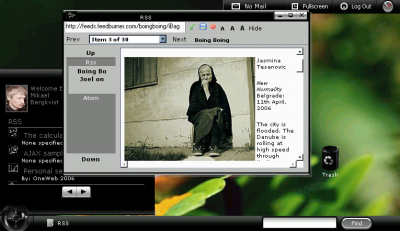XIN - a Web OS that wants to be a platform

Recently Mikael Bergkvist has been showing me his "It's basically Windows' entire concept - only online." new web-based OS, called XIN. Mikael first got in touch with me about it back in October last year - and to be honest it's taken me this long to (almost) grok what he's on about! XIN is an online Ajax OS, which runs server/client applications on a virtual desktop. Mikael says it has been coded using "the simplest possible XML for the greatest possible rich apps".
XIN has set out to achieve two main goals:
1) It aims to be a web operating system that enables users to run a variety of applications within a web browser - similar to other such products, like YouOS. Mikael told me it's "very simple to create, run and install new apps for this 'desktop', privately and/or globally". The XIN how-to page covers the basics. One example is a calculator app, which Mikael explained:
"Notice that everything is contained in this one single XML file, both server and client-side code, as well as the HTML for the interface. It's very similar to plain DHTML, but with a twist. The server-side offers a wide range of objects and a SQL database to work with, so the developers are well equipped to create any type of cool stuff that they want to."
There's also an online document authoring tool, which seems very alpha and isn't as classy-looking as Writely or similar services yet. However Mikael wants us to look deeper than the surface. He says the difference between XIN and other solutions is that "you have absolute server-rights for the apps that you create - and that means the exact same power as any other server/client service found on the web, no matter how sophisticated." He also noted that the AJAX interface is "implemented automatically for the apps, so the developer never has to think about that even for a second."

2) The second main goal of XIN is to produce next generation applications on the XIN Web OS platform. This goal is a long-term one and requires a decent user base and the app list to be fleshed out some more. Mikael somewhat cryptically told me:
"It's something I can't go into in detail as of yet, but it will involve the kind of apps that the industry has speculated about for a while, but which never seem to have materialized - because they're way too sophisticated. The desktop will remain cost-free though, regardless."
When I asked for more details, Mikael told me XIN basically wants to be an OS platform like Microsoft and Apple. He's thinking big:
"Let's say we get 100 000 users of this free desktop with the basic set of apps. Let's say it proves to be useful and fun, and they return to it, and use it for email and news and stuff.. Let's say that they discover that they can easily add more powerful apps - not widgets or gadgets - but real, heavy stuff - to the desktop for a minor fee, like mediaplayers, cms, poker, sms, photo-management, etc. All looking pro and with far more than just 'basic functionality', which is 'what is' today - let's be fair about that.
You won't even have to market any of these apps as a developer - we do that for you, [because] we think it's worth doing that app for that single reason alone for any developer or small company. It will be instantly noticed by all of those 100 000 users/buyers, because it's thrown right in the middle of the highway [the desktop] right away - by us - and it will be instantly worth it as a result. We will make it easy to develop, we will make it cheap to develop, and we will make sure everyone knows about your product right away, and we will manage the sale and take a percentage of that. It's basically Windows' entire concept - only online."
So XIN appears to be much more than a Web Office-like suite of tools. As Mikael describes it, XIN is an actual OS which he says is easy to code for:
"This is not some fancy DHTML desktop that just opens iframes in DHTML windows, it's more of an actual OS. An OS is handling the relationship between the code and the hardware, that's why you need it."
It'll be interesting to track the progress of XIN and see if it makes much headway into the OS market. It seems to me like an interesting long-term concept experiment, at the very least. Will an entirely Web-based OS be able to make inroads as a full development platform, like Windows or Linux? I'm not qualified to tell at this point, but I'm sure a number of ZDNet readers are. So I'm very curious to hear your thoughts. Do you think a Web-based OS like XIN is a viable development platform?